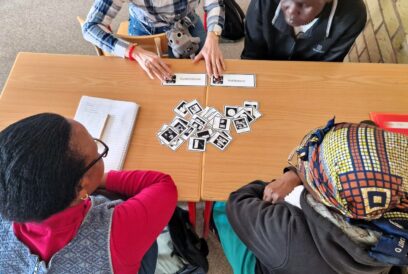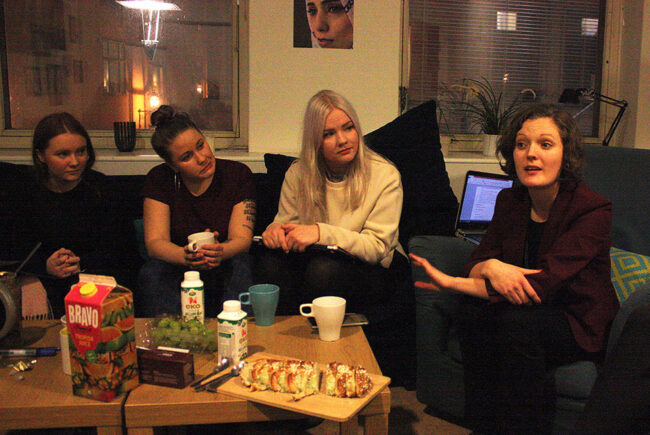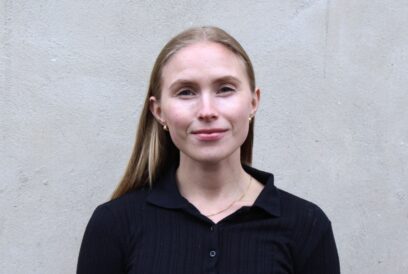

RealStars: Caroline Svahn, Jenny Forsman Lindeborg, Karin Östlund and Ottilia Eriksson at the RealStars volunteer meeting in Stockholm. / Photo: Marja Beckman
Volunteering against human trafficking – disagreeing with the like-minded
Published:RealStars: Caroline Svahn, Jenny Forsman Lindeborg, Karin Östlund and Ottilia Eriksson at the RealStars volunteer meeting in Stockholm. / Photo: Marja Beckman
Volunteers at the anti-trafficking organisation RealStars are rewarded with work experience and new skills. Sometimes this may mean testing one’s own views of right and wrong.
It is a February evening in Stockholm. Nine women, from teenagers up to early thirties, have gone out into the snowstorm to make a change on human trafficking.
The purpose of this wintery meeting is an introduction to volunteering for RealStars, an anti-human trafficking organisation. Some of the people present in the meeting are experienced, but most of them are new. This evening is led by Ottilia Eriksson, who is hired part-time to coordinate the volunteers, and Anneli Hårdén, intern from a communications training.
RealStars’ focus on the perpetrator of human trafficking makes them quite unusual. Most anti-trafficking organisations focus on the victim, but RealStars argue that human trafficking wouldn’t exist if there weren’t a demand. Their flagship campaign Fair Sex focuses on consent – that both parties should be interested in having sex with each other.
The organization was founded in 2010 by Malin Roux Johansson who previously worked as a Corporate Social Responsibility consultant at different organisations. Malin had experience from organisations like Greenpeace and Amnesty when she decided to found RealStars.
Today, the organization has a board, a reference group and an operations manager (Malin). A few people are project employees. All salaries are financed by the Swedish Inheritance fund.
– I often say that we are a network- and project organisation. We have built up a big network and RealStars is now a part of the EU civil society platform in Brussels, Malin says.
Why did these nine women brave the snowstorm, and what can they learn from this unpaid work?
Over half of Swedes are volunteers
Jenny Forsman Lindeborg is one of RealStars’ ambassadors which means that she coordinates other volunteers. To become an ambassador you have to attend an ambassador training for one day. Jenny, who soon takes a degree in criminology at the university, is an experienced volunteer, having started volunteering at sixteen. In Sweden, this is by no means unusual.
According to the report People in motion – civic engagement 1992–2014 (Ersta Sköndal college), 53 percent of the adult population in Sweden adds an average of 15 hours a month on voluntary work. The most common engagement (32 percent) is sports, but many also engage in charity, everything from saving abandoned cats to help immigrants speak Swedish. The volunteer matching organisation Volontärbyrån (The Volunteer agency) did its own investigation in 2015. It shows that the commitment has increased compared to the previous year. A lot of people want to help refugees and vulnerable children and young people.
– I have learned that a lot of people are interested in societal issues. Through this, I have regained my faith in people. You are exposed to so much negativity in news and social media, Jenny Forsman Lindeborg says.
– However, the disadvantage with the lack of resources in these kind of organisations is that people sometimes have too little time and don’t prioritize the volunteer work, she continues.
For Malin Roux Johansson, naming RealStar’s biggest triumph so far comes easily.
– I am very proud of our work with Hotels Against trafficking and that we have engaged 10 000 youngsters against trafficking in our Inheritance fund project.
– At the same time, one of our biggest challenges is to dispel the myths about prostitution and sometimes also the sex purchase law.
Disagreeing with the like-minded
In Sweden, Norway, Iceland, Canada, Ireland and France, the sex buyer is criminalized. Other countries like Germany and The Netherlands have gone the opposite way and made prostitution legal. The movement that wants to legalize prostitution argues that many sex sellers sell their bodies because they want to. The argument is that everyone has the right to make their own choices. Some arguing in this vein consider that it is only morality that distinguishes sex sales from other work – that all work is involved with selling something.
The arguments from opponents is an issue that the RealStars volunteers working in social media must be able to respond to. For example, the human rights organisation Amnesty International has decided to take a stand against criminalizing sex purchase, arguing that keeping prostitution legal is the best way to protect prostitutes.
This means that RealStars is disagreeing with organizations such as Amnesty – organizations that in broad terms are very similar in values to RealStars.
–We don’t have anything against those who sell sex out of free will, but we show facts that those people are a minority. Society is not black and white, Karin Östlund says.
Like Jenny Forsman Lindeborg, Karin is one of RealStars’ ambassadors and her task is to coordinate the volunteers who update the RealStars Twitter account.
– We need to write a list of which words we use in our communication. For example, we don’t write ”sex worker” because we don’t see sex as work.
Karin recounts another case where a volunteer told the others about an experience from a party, where some male guests boasted that they had bought sex in Germany.
– This is a difficult question, and it is easy to get upset when you hear someone talk like that. But to be able to make a change of attitude in society, you need to listen to what the person has to say, and then you need to have statistics and facts to argue with, Jenny says.
Working on such a morally grey area as prostitution, it may be problematic for the volunteers to form their opinion on whether prostitution is right.
– When I interview the volunteers, which I do with everyone who express an interest in being a volunteer, I usually go through RealStars’ view on prostitution. They also receive a volunteer policy in which we write about what we stand for and offer links to other places where they can read more. If you, as a volunteer, realize that you don’t agree with what we stand for, it might be better to search a place somewhere else. I have never had such a discussion, Ottilia says.
Coaching volunteers in discussion skills
RealStars provides argumentation tools for their volunteers to cope with situations where they may be challenged.
– I try to arrange my volunteer meetings so that there is room for discussion. The next volunteer meeting will, for example, be about how to guide the discussion in a good way. The idea is not to just toss around statistics but to find a good way to discuss with someone who doesn’t agree with us, Ottilia explains.
RealStars’ volunteer education also has value practices and workshops where different opinions and discussions are encouraged.
– I am convinced that it’s better to think for yourself than to just be assigned facts, Ottilia continues.
-We also have a knowledge platform – our blog – which we fill with important posts, and teaching examples about our themes, Malin adds.
But does RealStars protect its volunteers in case there is negative backlash in social media or in real life?
– As far as I know, we don’t really have a plan other than to talk about these situations afterwards and not to take anything personally, Ottilia says.
– For example, before a recent campaign, we went through some very practical things: how it feels to stand in public and talk to people. It’s also good to stand close to each other so you can help each other if someone ask questions you can’t answer.
Voluntary work – a learning area
In addition to argumentation skills, voluntary work offers several other learning opportunities.
– It depends a lot on the individual’s possibility and interest in engaging, but we can offer learning opportunities both about the issue with trafficking and in our different methods (advocacy, process management, lectures, research and knowledge discovery). They can also learn to use social media, create events, do actions, and much more, Malin says.
Except for the work in EU, RealStars co-operates with companies under the initiative Business against trafficking. In Hotels against trafficking, they provide hotels with tools to prevent trafficking.
RealStars also lecture in schools and arrange art contests where young people are encouraged to create pictures against trafficking. They have also co-worked with artists at exhibitions and fashion designers who have made clothes especially for RealStars.
Yet another part of RealStars is the agent avatar Kim, a digital entity who is the public face of the online project Fair Sex Online. Kim’s task is to spread values of equal sex and act as a whistleblower about sexual abuse online.
”The lecture really opened our eyes”
Back to the volunteer meeting in Stockholm, where the snow keeps falling outside. Anneli says she wants help to go to the airport to distribute a newspaper on March 8th, International Women’s Day.
– We want it to be handed out to men who look like business travellers because that’s a common group among sex buyers, she says.
Three new volunteers are joining the organization’s ranks. Karina Manlykova, Dolores Diaz and Caroline Svahn are students at the gymnasium Stockholm hotel- and restaurant school and found out about RealStars through one of their school lectures. The women will be future hotel staff.
– At the RealStars lecture, we were told about check lists which make it easier to discover trafficking. If you see a woman with a much older man, you ask for the woman’s name and tell them that you need all the hotel guest’s names in case there is a fire, Dolores says.
Karina adds:
– And you should listen to your gut feeling. If it feels wrong, it probably is wrong. The man doesn’t become nervous if the woman is his daughter.
The new volunteers all agree:
– It is really good that RealStars visit schools. Before, of course we knew that trafficking exists, but the lecture really opened our eyes.






